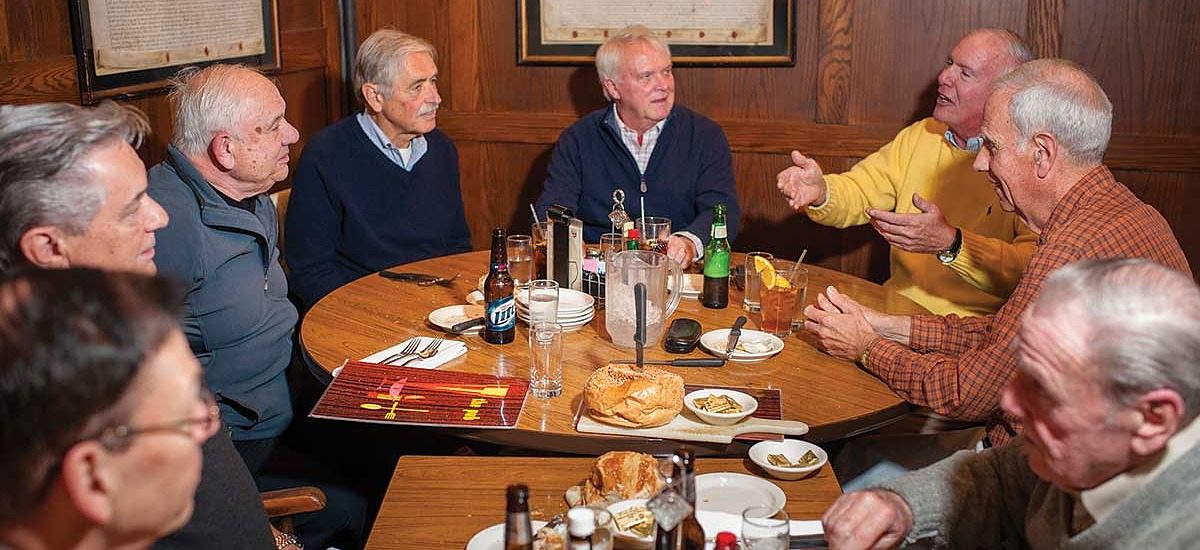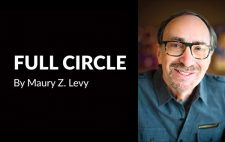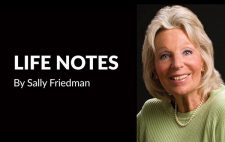If you grew up in SJ or Philadelphia, you welcomed the same Philly newscasters into your living room for the news of the day. Their faces became familiar. Their voices immediately recognizable. After decades of reporting, these popular icons have now retired, but they stay in touch, meeting for lunch in SJ a few times a year. They call themselves the R.O.M.E.O.s – retired old men eating out.
“On the night I retired out of Channel 3 in 2008, Dick Sheeran, who I had worked with for 40 years, said ‘Why don’t we get a few of us together for lunch?” recalls Dick Standish.
Six retired station employees, mostly from KYW-TV, met for some pasta and garlic bread. They filled in each other on their families, brought up old station war stories and argued about who was enjoying retirement more.
“We said, ‘Let’s do this again,’ and one thing led to another,” adds Sheeran.
Every two or three months, the group would plan its next outing, and through word of mouth, the posse continued to grow. Little did they know their merry band of six would swell to as many as 70. As women joined, the “M” in their name needed a new meaning.
“We became the Retired Old Mavens Eating Out,” says Gary Mirkin, an ex-KYW technician who calls himself the communications maven for the group.
“We are a loose group of people who worked in Philadelphia communications and have either moved on to something else or retired. We have no dues, no meetings and no officers. The broadcast industry is very small, and people go from station to station and make friends at a lot of the stations. There were some people at one of our lunches who I hadn’t seen in 30 years.”
“The best part is that it’s totally unorganized and disorganized,” adds Robin Mackintosh. “We show up, no matter how many people, we take a head count, whack up the bill 30 or 40 ways, and say, ‘We’ll see you in a few months.’”
Take a look at what some of these old mavens have been up to since retiring:
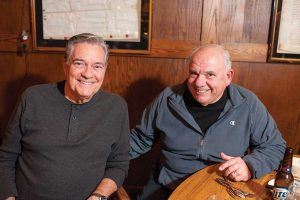
Dick Standish worked at KYW-TV for 29 years. Dick Sheeran beat his colleague by one year, retiring from KYW-TV after 30 years
Dick Sheeran
Career: Best loved as the kid from the neighborhood who never forgot his roots, Sheeran, 74, started out as a copy boy at the Philadelphia Daily News while still in high school. He worked his way up through the ranks at the paper, then spent five years at KYW radio, despite his friends’ warnings that it would be a mistake to work for a radio station that doesn’t play records. In 1973 he joined KYW-TV, retiring in 2003 after 30 years as a reporter and occasional anchor.
Life Today: Sheeran lives on the Boardwalk in Atlantic City, where he enjoys watching the ocean. He recently published his memoir, “News Hound.” “I was on television in a major market every day for 30 years, which is very exciting,” he says. “But when I saw my book in a store window, I got so excited. There’s something special about books and the print media.” He’s enjoying book signings and speaking to groups about his career and growing up in South Philly after WWII.
Favorite Story: “In 1979, the Iranians were holding our people hostage, and Jimmy Carter was in the White House. President Carter was running against Ronald Reagan and he couldn’t go out and campaign, so he invited reporters from all around the country to come to the White House to interview him. I was excited about it – a local TV reporter doesn’t get invited to the White House every day. So I called my wife and said, ‘Guess where I’m going tomorrow – to the White House. She says, ‘Bring me back two cheese subs.’ My wife was not into politics and thought I was going to the White House restaurant in Atlantic City.”
What He Misses About Broadcasting: “When a big story breaks, it tugs on you a little bit.”
Dick Standish
Career: Best known for his political reporting, Standish, 71, covered eight national political conventions. He got his start in 1967 at KYW radio, where he worked for 12 years. Standish then spent the next 29 years at KYW-TV.
Life Today: Since retiring, Standish has enjoyed spending time with his family. “I spent time with my mother in New England when she was in a nursing home,” he says. “She made it to age 97 and passed last May. I’ve also been digitizing family photographs and making them into slide shows and videos.” He and his wife have also hit the road, jaunting to New England, Florida and the Outer Banks.
Favorite Stories: “One thing I enjoyed the most were the conventions – I was lucky enough to do a lot of political coverage, including the first year that satellite technology was used in the conventions for local stations,” he says. “That was 1980. All the time I was in TV there were tremendous changes in technology and how things were done with wall-to-wall coverage. Now it’s routine, but at the time, it was pretty interesting.
“I was also at the second MOVE [incident] in 1985 doing routine reporting. It was difficult to know where the gunshots were coming from. You’d be with the police ducking down on one side of the car. Not that we were in the combat zone, but they were worried about MOVE having people with weapons out in Cobbs Creek Park, so once they were firing their weapons, you didn’t know exactly where it was coming from.”
What He Misses About Broadcasting: “I saw a quote that said, ‘I don’t miss the rat race; I do miss the rats,’” he says. “Actually, I miss the rat race a little bit, but I miss the rats – the people I worked with.”
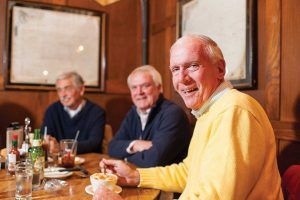
Robin Mackintosh worked at KYW-TV for almost 40 years
Robin Mackintosh
Career: Honored by President Ronald Reagan at the White House for a series on volunteerism, Mackintosh, 68, devoted 40 years to local broadcast news. After earning his chops as a copy boy at KYW radio in 1968, he moved to KYW-TV in 1970, retiring in 2008.
Life Today: For Mackintosh, retirement is a beautiful thing. “It’s like hitting yourself in the head with a hammer,” he says. “It feels great when you stop.” He and wife Barbara, a retired schoolteacher, enjoy spending time visiting their five grandkids. “We do a lot of babysitting. My son had premature twin boys last June, and one was 1½ pounds, and one was 2½ pounds. We spent a lot of time in the intensive care unit last summer. I have a daughter in Washington with two kids, 8 and 5, and my youngest son got married a couple years ago and lives in Tallahassee, Fla., so we go to visit them. I feel an obligation to tell people that retirement is great.”
Favorite Story: “I spent five days up in New York for 9/11, the most memorable five days of my life. You’re up there interviewing people who lost loved ones, and it’s very intense. You’re turning on the lights at night and watching this dust blow through, listening to the New York Health Department say there’s no problem, the air is fine. Of course, we find out later it wasn’t so fine. Everybody was wearing masks while Ground Zero was blowing over us.”
What He Misses About Broadcasting: “I was taking a walk, and I saw a chopper flying overhead,” he says. “After 40 years of covering two-alarm fires, major storms and presidents as a reporter in a helicopter, I miss that. It was an exciting time in my life, and it’s not so exciting anymore. But grandchildren replace excitement any day.”
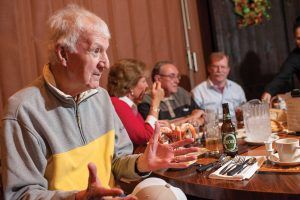
Known as “Big Al,” sportscaster Al Meltzer worked on air for 35 years
Al Meltzer
Career: Legendary sportscaster Al Meltzer, 85, worked at most of the local broadcast outlets after arriving in town from Buffalo in 1964. His most impactful stint may have been helping Channel 17 get on the air as a station devoted to sports, and providing the voice of Big 5 basketball and the 76ers. He retired in 1999, only to spend the next five years helping Comcast with various projects.
Life Today: Meltzer spends most of his days in retirement watching sports on TV – any and all sports, although pro football is his favorite. “I did the Buffalo Bills games for nine years and then did preseason with the Philadelphia Eagles,” he says. “Basketball is my second favorite, because I played the game and broadcast the game.”
Favorite Stories: “The 76ers were doing a show called ‘Where are They Now?’ and they asked me if I could get in touch with Wilt Chamberlain. I went to California with a producer and a couple of cameras, and we sat on the top of a hill and talked for about two-and-a-half hours until the tape ran out. We then spent the next couple hours talking about everything in the world, not necessarily basketball. I got to know him in that time, and it’s a shame, six months later he left us.”
Meltzer covered the Buffalo Bills while O.J. Simpson was the star running back. “I think he was the best athlete I ever saw,” Meltzer says. “I spent nine years with O.J., and he was as good as they got. He was the nicest guy you could possibly imagine. When the games were over, he was the last guy to unwind and get in the shower, because anyone who wanted to talk to him after the game – and that included sports writers from high school – he was always there for. When I knew him he was a wonderful guy, and then he got into the movies and it all came apart.”
What He Misses About Broadcasting: “The people I worked with,” he says. “That’s why the moments we share together during the year are very, very critical.”

Steve Levy
Steve Levy
Career: During a broadcast career spanning 35 years, Levy, 66, made the rounds at three Philadelphia television stations, covering everything from sports to politics to entertainment. His longest stint, at WCAU, lasted 23 years – from 1982 until his 2005 retirement.
Life Today: “One of the things I started to object to was the alarm clock,” says Levy. “My first show started at 5 am, so now I’m loving that the sunshine or one of my dogs wakes me.” Levy and his wife split their time between Philadelphia and their Colorado ranch, named Six Peaks Ranch for their six children. “We have a lot of really good family stuff going on now – the kids are getting married, there are two grandkids now and we’re expecting more. I’m thinking about getting into some freelance work. Bill Henley loaned me a microphone of his, so I can record some things at home and see how I like it.”
Favorite Stories: “When I was at Channel 6, I came up with an idea for an ongoing series called ‘Here’s How with Steve Levy.’ I would go out with a camera and take lessons in various things. I did a story on how to box with Muhammad Ali, so I got in the ring with Ali. We went out during training camp, and it was terrifying but fun. Then I did a five-part series on what it’s like to try out for a pro football team, so I tried out for the Eagles. That was also terrifying but fun. Growing up in Philadelphia, if you got a chance to go to an Eagles training camp, that was a dream come true. It’s a pretty good job when you can get paid to go out and have fun.
“I also got to interview Tom Selleck. I asked one of the stupidest questions I’ve ever asked, and he handled it with great humor. The movie was ‘Quigley Down Under,’ and the theme is that he’s an American cowboy in Australia who’s a super marksman. He can shoot something that’s 90 miles away. During the interview I said, ‘During that movie, were you the one shooting that rifle?’ As soon as I said it I knew how stupid that was because of course he was shooting the rifle. But his answer was, ‘That was me shooting it, but I wasn’t the one hitting the target. That was all editing.’ He was a gentleman and a great guy to interview.”
What He Misses About Broadcasting: “The adrenaline,” Levy says without missing a beat. “I didn’t always stick to the script, so when something live was happening, that’s when I really enjoyed broadcasting.”
Cherie Bank
Career: As a college intern at KTVI-TV in St. Louis, Bank found her calling in broadcast journalism. In 1979, she moved to Philadelphia and joined WCAU-TV, where she spent 30 years as a medical reporter before retiring in 2009.

Bill Baldini worked at WCAU-TV for 42 years; Cheri Bank was the station’s medical reporter for 30
Life Today: “I’m living the good life,” says Bank. “I’m taking care of my daughter. She’s in three sports, and I get to go to all of her sporting events. I never got to do that before. I’m taking classes at the Barnes Foundation, artNOW in Philadelphia. I get to see my friends and go out to lunch, and it’s really a lot of fun.”
Favorite Story: “Going out to the set of ‘MASH’ in Hollywood and interviewing Alan Alda, Loretta Swit and all those famous people. We spent 13 hours on the set right before they were closing down production. The story was about what a successful show it had been and all the nuances of the show – how they never had applause or laughter in the operating room, and how it told the story of Vietnam while acting like it was telling the story of a different war. It was about how popular these people had become and what a great show it was.
What She Misses About Broadcasting: “I miss the great, fun stories that were so important to tell and helped save people’s lives. I got letters about that all the time. Who gets to do that in their career? Not many people.”
Bill Baldini
Career: The longest-working TV reporter in Philadelphia history, Baldini, 71, spent 42 years at WCAU-TV. He covered everything from presidents to the man on the street and even spent a few years on the SJ beat.
Life Today: “I do things that I could never do,” he says. “For 42 years somebody would call me and ask to go to lunch next week, and my answer would always be no. Reason being, I never knew if I’d be in North Philadelphia, New Jersey or Europe. Now, I go out to lunch all the time. It’s a little thing but a big deal with me. I can sleep late now, go to the gym and the most important thing is seeing my four grandchildren. They are the great joy of my life. My wife Joan and I go on vacations now. We just spent 36 days in Australia, New Zealand, the South Sea Islands and places like Tahiti. It’s fantastic.”
Favorite Story: “The best story I ever did was the first story I ever did,” says Baldini. “I was 25, and it led to the closing of Pennhurst [State School and Hospital] and a revolution in the field of mental retardation – the way people looked at it and treated people. I believe people are basically good, and if you give them a good reason to do the right thing, they will. The most important part was that people were so upset with what they saw that they caused a revolution to change it.”
What He Misses About Broadcasting: “The diversity, when you’re meeting different people and doing different things,” he says. “I remember being in the core of a nuclear reactor before it was built, thinking to myself, how many people on this earth can do something like that.”

